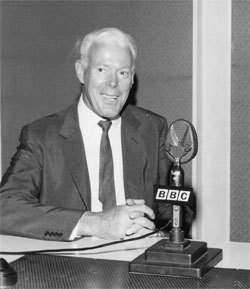Predictability 24 August 1981
Trevor Leggett was head of the Japanese Department of the BBC.

This is one of his broadcasts to Japan
ZUBARI for 24 August 1981
Predictability
Last week I was talking about the view of some scientists that animals are like unintelligent machines, which only seem to be intelligent because their internal programmes (evolved by natural selection) are efficient at preserving them and their off-spring. These scientists point out how predictable animals are.
But to be predictable is not necessarily to be machine-like and without feeling. A man of strong will who has made up his mind, is predictable; one can predict that he will generally attain his purpose. But that does not mean he is without feeling or intelligence.
Ovchinnikov, in his recent book on Britain, translated into Japanese under the title Kashiwa no Ne, says that both the Japanese and British are more predictable than the Russians. He has been Tass correspondent in both our countries, so his opinion is valuable. But he does not seem to think that this makes us machine-like. He rather admires it.
Arthur Koestler, in his book on India and Japan, did think Japanese were machine-like. In fact, he called Japanese people ‘robots’. But clearly that was because he had not been long in Japan and did not know Japanese – he had also obviously never been to a Japanese party!
Even the so-called machine-like animals, have a sense of fun. In Britain, where we have many dogs, and where the dogs live in the house with us, owners call the dogs by their name. They are trained to respond and come when called. But some owners, especially men, use a special whistle to call their dog for instance a long high note, and then a much lower short one. Or perhaps a triplet.
Now, many parrots can imitate a whistle. I have seen a family where the parrot learned to imitate exactly the whistle of the dog’s master. Then sometimes when the parrot was in the room with the master there, and the dog was in another room, or perhaps in the garden, the parrot would suddenly give a perfect imitation of the master’s whistle. The dog hearing it, would joyfully rush into the room and look round. The parrot would flap its wings and dance and screech with excitement. It clearly enjoyed having fooled the dog.
That shows intelligence, and a sense of fun. Nothing machine-like there.
Well, till next time.
© Trevor Leggett